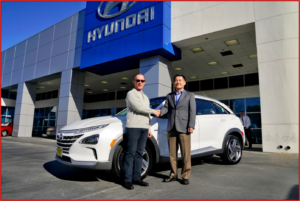Hyundai Motor Co. and Kia Corp. plan to invest $7.4 billion in the U.S. by 2025 to produce future EVs, enhance production facilities and further its outlays in smart mobility solutions. The Korean automaker claims Hyundai Motor Group’s investment will enhance overall product competitiveness by highlighting future mobility technologies, including electrification and hydrogen energy.
Hyundai Motor will offer a line of American-made electric vehicles to U.S. consumers starting next year. Hyundai and Kia will monitor the market conditions and U.S. government EV policy to finalize its plan to enhance its U.S. production facilities and gradually expand its local EV production.
Late this Hyundai will start a demonstration project in preparation for commercialization of fuel cell electric trucks where it is currently trailing Toyota. Hyundai Motor will also work with local partners to conduct a hydrogen refueling demonstration project for fuel-cell electric trucks. and provide logistics between port and inland warehouses by utilizing fuel-cell electric trucks.
Hyundai is lagging Toyota* but mimicking its approach with partnerships by way of hydrogen, energy and logistics companies globally. Hyundai Motor Group claims it has “expanded its fuel cell system business, accelerating development of a hydrogen society and laying the foundation for the company’s HTWO brand.” The initial activities will occur in Korea, the United States, Europe and China.
Hyundai Motor Group said it looks forward to working with the U.S. government and other business partners to expand the U.S. hydrogen energy ecosystem. The Group is committed to fostering a hydrogen society to create new business opportunities for a sustainable future. Hyundai had previously made an agreement with Cummins Inc., an U.S. based company which specializes in advanced powertrain, to accelerate deployment of fuel cell electric systems in the U.S. market. How this works with the Biden Administration plans to promote American jobs remains to be seen.
Hyundai Motor Group signed an MOU with the U.S. Department of Energy in February 2020 to cooperate in hydrogen fuel cell technology innovation and global expansion. This included the installation of a hydrogen refueling station and providing NEXO SUVs.
Hyundai Motor Group will also launch a subsidiary in Washington, D.C. to lead the Group’s mobility projects. The Group also will establish a presence in the robotics field through Boston Dynamics. The Group announced last year that it agreed to acquire a controlling 80% interest in Boston Dynamics in a deal that values the mobile robot firm at $1.1 billion.
In addition, Hyundai Motor Group has created the joint venture, Motional, in partnership with the U.S. mobility technology firm Aptiv. Focused on commercializing driverless technology, Motional has obtained the industry’s first driverless license in the state of Nevada and plans to commercialize robotaxi service in 2023 along with its partner Lyft. Motional has started testing Hyundai’s all-electric IONIQ 5 equipped with advanced autonomous driving technology on public roads.
Together, the Hyundai Motor Group and Motional will enhance its autonomous driving technology in preparation for Lyft’s robotaxi launch in 2023.
*See AutoInformed.com on
- Toyota Gen 2 Prototype Fuel-Cell Trucks to Start Drayage Runs at the Ports of L.A. and Long Beach. Carbon Free Hauling
- Japan Inc: Toyota and Hino to Pioneer Light-Duty Fuel Cell Electric Trucks with Seven-Eleven, FamilyMart, and Lawson
- Japan Hydrogen Association Bolstered by Toyota Membership
- Toyota and Hino Heavy-Duty Fuel-Cell Electric Truck Verification Tests Start in the Spring of 2022
- JR East, Hitachi, Toyota to Develop Fuel Cell Railway Vehicles



Pingback: Dealer Demise? The Hyundai Amazon Digital Retail Experience | AutoInformed